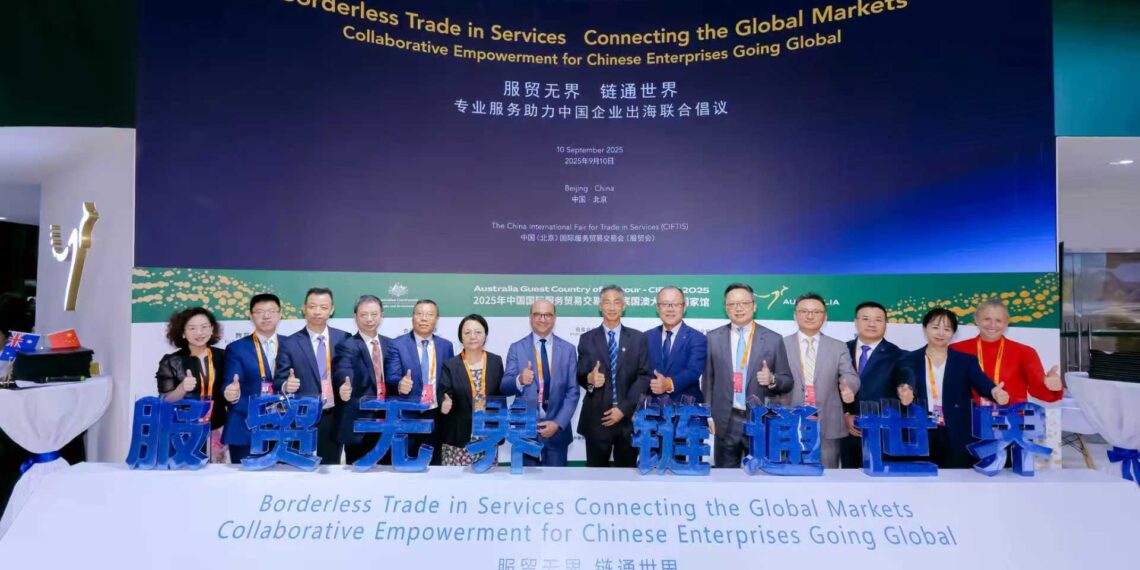Select Language:
The overseas expansion of Chinese companies is opening up new opportunities for service trade amid a complex and unpredictable global economy, according to industry experts. As international trade shifts focus from goods to services, sectors such as new energy, electric vehicles, and cross-border investments have emerged as primary areas for cooperation, offering Chinese firms unique pathways for global growth. Dale Pinto, President and Chairman of CPA Australia, shared these insights at the China International Fair for Trade in Services 2025, held in Beijing from September 10 to 14.
The Chinese government’s strategy to promote global expansion has heightened demand for financial services in areas such as investment, financing, and cross-border insurance—crucial supports for companies venturing overseas. Given the impact of geopolitics and complex market conditions, companies are increasingly prioritizing supply chain diversification for technology acquisition and market access. Outbound investments are shifting toward Asia, especially ASEAN countries, while investments into North America and Europe have slowed, increasing demand for related professional services.
“Chinese companies expanding internationally encounter compliance challenges both in taxation and finance,” explained Justin Qiu, President of CPA Australia’s North China Committee for 2021–2022, and Managing Partner at Baker Tilly China. Countries are tightening their tax regulations, making it essential for companies to stay updated on these rules, especially in regions with volatile tax policies such as the Middle East and Africa. Penalties for non-compliance are growing harsher globally, adding pressure to cross-border operations.
For instance, a Hong Kong-based gaming company was fined over ¥1.8 billion (approximately $12.2 million USD) by Japanese tax authorities for failing to report consumption tax on in-app sales from Japanese users. Similarly, a cross-border e-commerce firm in the U.S. faced over $400,000 in back taxes and penalties and was threatened with liquidation by California authorities over unreported sales revenue.
The implementation of a global minimum tax rate further complicates matters. The OECD’s Pillar Two rules, part of its Base Erosion and Profit Shifting 2.0 initiative, enforce a 15% minimum tax rate worldwide, significantly affecting Chinese firms operating profitably in low-tax jurisdictions. One company, for example, had to close its holding unit in a low-tax area to streamline its organization and simplify tax reporting.
Financial compliance presents similar hurdles. Companies must often manage differing standards like International Financial Reporting Standards (IFRS), U.S. GAAP, and local accounting rules, impacting decision-making processes. Rising costs of compliance and a shortage of specialized talent compound these challenges. Companies expanding internationally often face higher local tax filings, audits, and disclosure requirements, driving up expenses.
There is a notable shortage of professionals skilled in overseas financial compliance, requiring expertise in local tax laws and bilingual communication. This talent gap increases labor costs, as exemplified by a Chinese AI chip company listed in New York that encountered problems due to export control complexities and a lack of bilingual legal support.
During a recent forum, a senior legal expert discussed how geopolitics influences Chinese overseas investments. Some firms ship products to countries like Vietnam, categorizing them as originating there to benefit from U.S. tax incentives. However, Vietnam’s government, wary of potential tariffs or regulatory changes aimed at avoiding tariffs, has intensified oversight of such activities.
Despite these hurdles, there are significant opportunities in the professional services market. Companies are advised to view compliance costs as long-term investments that, with proactive planning, can mitigate future challenges. Developing comprehensive compliance frameworks aligned with both Chinese and international standards, including environmental, social, and governance (ESG) practices, is essential for gaining entry into advanced and emerging markets.
Enhancing supply chain resilience through regional diversification, improving supplier management, and utilizing agreements like the China-Australia Free Trade Agreement can help optimize supply chains. Early risk assessment and secure contractual protections in tax and business agreements are especially vital for small and medium-sized enterprises to avoid costly disputes and streamline integration after mergers or acquisitions.
As of last year, Chinese investors had established approximately 52,000 overseas companies in 190 countries and regions. Outbound direct investment increased by 8.4% year-over-year to $192.2 billion, representing 11.9% of global flows—an increase from 11.4%—maintaining China’s position among the top three global investors for the 13th consecutive year. Overall, China’s total outbound investments reached $3.14 trillion by the end of last year, ranking it among the world’s top three for the eighth straight year.







